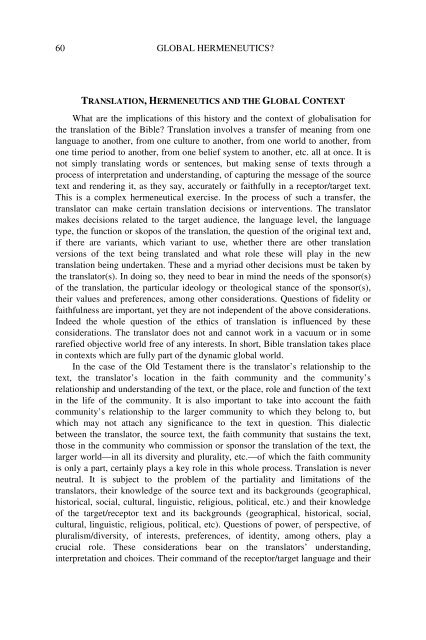Global Hermeneutics? - International Voices in Biblical Studies ...
Global Hermeneutics? - International Voices in Biblical Studies ...
Global Hermeneutics? - International Voices in Biblical Studies ...
Create successful ePaper yourself
Turn your PDF publications into a flip-book with our unique Google optimized e-Paper software.
60 GLOBAL HERMENEUTICS?<br />
TRANSLATION, HERMENEUTICS AND THE GLOBAL CONTEXT<br />
What are the implications of this history and the context of globalisation for<br />
the translation of the Bible? Translation <strong>in</strong>volves a transfer of mean<strong>in</strong>g from one<br />
language to another, from one culture to another, from one world to another, from<br />
one time period to another, from one belief system to another, etc. all at once. It is<br />
not simply translat<strong>in</strong>g words or sentences, but mak<strong>in</strong>g sense of texts through a<br />
process of <strong>in</strong>terpretation and understand<strong>in</strong>g, of captur<strong>in</strong>g the message of the source<br />
text and render<strong>in</strong>g it, as they say, accurately or faithfully <strong>in</strong> a receptor/target text.<br />
This is a complex hermeneutical exercise. In the process of such a transfer, the<br />
translator can make certa<strong>in</strong> translation decisions or <strong>in</strong>terventions. The translator<br />
makes decisions related to the target audience, the language level, the language<br />
type, the function or skopos of the translation, the question of the orig<strong>in</strong>al text and,<br />
if there are variants, which variant to use, whether there are other translation<br />
versions of the text be<strong>in</strong>g translated and what role these will play <strong>in</strong> the new<br />
translation be<strong>in</strong>g undertaken. These and a myriad other decisions must be taken by<br />
the translator(s). In do<strong>in</strong>g so, they need to bear <strong>in</strong> m<strong>in</strong>d the needs of the sponsor(s)<br />
of the translation, the particular ideology or theological stance of the sponsor(s),<br />
their values and preferences, among other considerations. Questions of fidelity or<br />
faithfulness are important, yet they are not <strong>in</strong>dependent of the above considerations.<br />
Indeed the whole question of the ethics of translation is <strong>in</strong>fluenced by these<br />
considerations. The translator does not and cannot work <strong>in</strong> a vacuum or <strong>in</strong> some<br />
rarefied objective world free of any <strong>in</strong>terests. In short, Bible translation takes place<br />
<strong>in</strong> contexts which are fully part of the dynamic global world.<br />
In the case of the Old Testament there is the translator’s relationship to the<br />
text, the translator’s location <strong>in</strong> the faith community and the community’s<br />
relationship and understand<strong>in</strong>g of the text, or the place, role and function of the text<br />
<strong>in</strong> the life of the community. It is also important to take <strong>in</strong>to account the faith<br />
community’s relationship to the larger community to which they belong to, but<br />
which may not attach any significance to the text <strong>in</strong> question. This dialectic<br />
between the translator, the source text, the faith community that susta<strong>in</strong>s the text,<br />
those <strong>in</strong> the community who commission or sponsor the translation of the text, the<br />
larger world—<strong>in</strong> all its diversity and plurality, etc.—of which the faith community<br />
is only a part, certa<strong>in</strong>ly plays a key role <strong>in</strong> this whole process. Translation is never<br />
neutral. It is subject to the problem of the partiality and limitations of the<br />
translators, their knowledge of the source text and its backgrounds (geographical,<br />
historical, social, cultural, l<strong>in</strong>guistic, religious, political, etc.) and their knowledge<br />
of the target/receptor text and its backgrounds (geographical, historical, social,<br />
cultural, l<strong>in</strong>guistic, religious, political, etc). Questions of power, of perspective, of<br />
pluralism/diversity, of <strong>in</strong>terests, preferences, of identity, among others, play a<br />
crucial role. These considerations bear on the translators’ understand<strong>in</strong>g,<br />
<strong>in</strong>terpretation and choices. Their command of the receptor/target language and their




